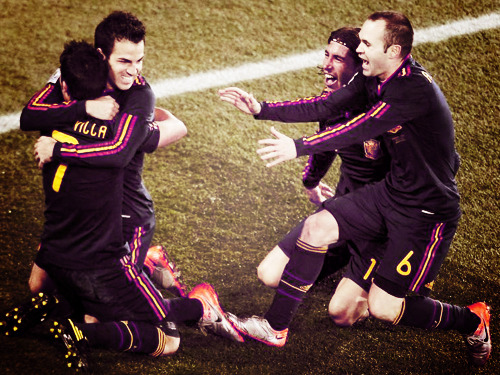Learning to empathise with Fabregas’ desires
Learning to empathise with Fabregas’ desires


Life revolves around competition. Lions compete with hyenas and cheetahs for a slab of that voluptuous-looking gazette thigh, Beyoncé and Lady GaGa for that coveted Grammy, while republicans and democrats battle for presidency every four years. When Francesc Fabregas heads away from the Emirates Stadium to join the Spanish armada in that patriotic quest known as international football, he is drowned in an environment where the word ‘losing’ is perpetually absent from vocabulary. His face is pressed up against the shaggy hair of Carles Puyol, the scruffy beard of Gerard Piqué, and the hideous goatee of David Villa. In that very moment, the truth is laid bare for the Arsenal captain – success lies on the other side of the divide.
All it takes is a little social nudging (see Thaler and Sunstein, in a book called Nudge). That nudge may come in the form of a failed transfer bid, an enticing press conference, or by the forcing a Barcelona jersey on said midfield schemer. A friend of mine once said to me, after a considerable length of time in the same relationship – ‘I find that if, at any point, an element of doubt has crept into your mind as to whether this person is the right one for you, then things are not going to work out. This seed of doubt will linger, and it will then manifest into something far larger’. I then asked if she had ever experienced that with her current boyfriend, to which I received nought but a resounding no. Doubtlessly, there lies a whole tree of doubt in Fabregas’ mind regarding his future in North London, one that is watered every time he pulls on the red jersey of his home country, and allowed untold amounts of sunlight every time the transfer window creaks open.
The epiphany that has occurred in Fabregas’ mind can be accounted for as such. There is, also, the question of affinity. In the study of sociology, affinity is described as a kinship of spirit and interest. When we say that there is no place like home, we feed into this definition. All there is left for us to do, once we are done complaining (an act performed in vain), is to empathise. Atticus Finch, one of the greatest fictional icons of the 20th century, ever so memorably and inspirationally said to his daughter, Scout, “You never really understand a person until you consider things from his point of view – until you climb into his skin and walk around in it”. That is all there is to this. Francesc Fabregas may have spent the last eight years as an Arsenal player – and a model one at that – but the last grain of sand has seeped from his hourglass. It is time for him to return home, hopefully with the best wishes of the fans who have had the pleasure of idolising him for just under a decade.
In this age of globalisation, we will all have to come to terms with the ever-changing meaning of the word ‘loyalty’. The Premier League has very swiftly become the richest, most international of sporting fronts, and with this greatness comes the inevitable catch we have been alluding to. Carlos Tévez and Samir Nasri fall into this bracket – the former is not a Manchester native, and the latter is not a Londoner. Tévez has arguably achieved all there is in the sport – he has almost single-handedly saved a club from relegation, won a domestic and continental title, and earned over £1m a month over the past couple of years. His affinity lies with his daughters, and regardless of what the critics may say, that is an altogether comforting notion. Nasri, on the other hand, is just a few steps behind – he is seeking success, and he plainly does not see it materialising at Arsenal.
These wantaway players should not be scoffed at. We just need to learn to understand, because there will be a time in our lives where we forsake whatever bonds we have built to achieve something greater. We must learn to empathise.







